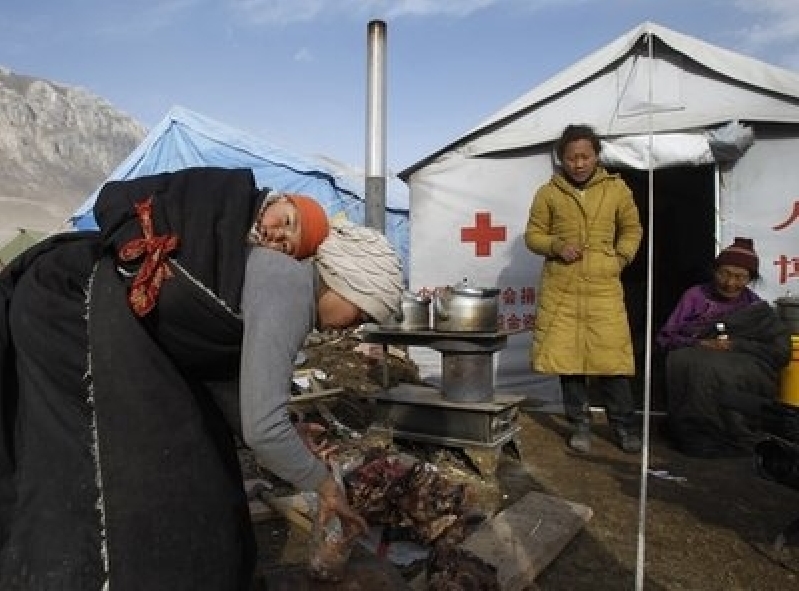
Relief groups distributing aid to survivors of last week’s massive quake in China’s Yushu County are braving the below-freezing temperatures and working to overcome a number of obstacles to alleviate the suffering of thousands.
Since the 7.1-magnitude quake hit northwest China's Qinghai Province on April 14, local relief groups have been working tirelessly on the ground to distribute relief goods, backed by larger international organizations, including Caritas Internationalis and ACT Alliance.
According to Meimei Leung, who is leading the assessment team of international NGO World Vision in the affected area, adequate shelter and warm clothing for children and families is a key concern, as average temperatures in the area have been hovering between -3 to 14 degrees Celsius.
“The weather in the quake-hit region is bad with snow and intermittent rain in these few days, which have increased the suffering of survivors sleeping outdoors after thousands of homes collapsed,” added a staff member at Xian Catholic Social Service Centre (XCSSC), who told partner Caritas Hong Kong that the bad weather threatens transportation and relief work.
“The local government is afraid that the icy weather will bring more misery in the days ahead,” they reported.
Catholic Relief Services similarly highlighted the impact of the freezing temperatures, which – together with the high altitude, thin air, and lack of electricity – is hampering relief efforts.
“Some of the rescue workers have started to develop high-altitude sickness,” reported Laura Sheahen, CRS regional communications officer for Asia.
“[T]hey are purple-lipped and very short of breath,” she added Wednesday.
Because so many homes were destroyed by the quake, aid teams have had to sleep in cars overnight. During the day, aid groups treat the wounded and distribute food, including including tons of flour, tons of cooking oil, and thousands of boxes of noodles and hygiene kits.
Aid groups have also pitched tents in the displacement camps and are offering medical help and counseling services to survivors.
According to China’s state-run news agency, Xinhua, the death toll of last week’s quake climbed to 2,187 late Thursday. Around 80 people, meanwhile, are still missing and 12,135 remain injured – 1,434 in serious condition.
While hard-hit Yushu County has a sparse population of just 70,000 people, World Vision’s Leung said the higher number of casualties was the result of the epicenter’s close proximity to the county seat combined with the early morning time of the quake.
"The quake struck at 7:49 a.m. local time when most people were asleep, and many were trapped inside damaged buildings," she explained.
What’s worse – Yushu County is considered to be one of the poorest areas in China, inhabited mostly by herders who belong to the Zang minority group.
Furthermore, more than 1,200 aftershocks have shaken the region since the main earthquake.
“There has been a series of aftershocks and this can be very frightening for children,” said Victor Kan, World Vision’s humanitarian emergency director.
Coincidentally, last week’s earthquake struck roughly one month before the second anniversary of the massive earthquake in Sichuan Province, which lies 60 miles away from Yushu County, the area most affected by Wednesday’s quake.
The Sichuan quake, registered as a magnitude-7.9 temblor, killed nearly 90,000 people in 2008.
The Yushu quake also comes on the heels of the recent temblors in Chile and Haiti, which killed nearly 500 and more than 200,000 people, respectively.







